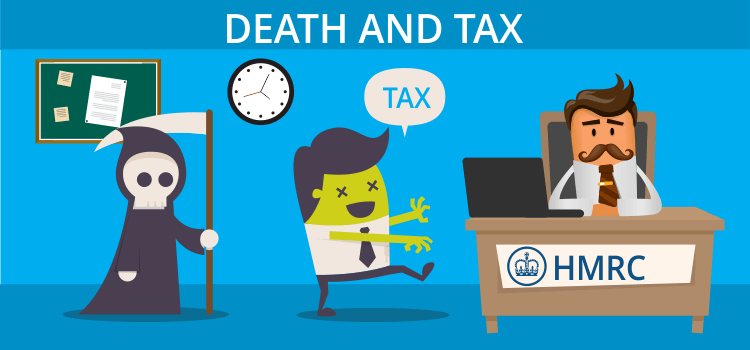In the 2021-22 financial year, taxpayers paid £700 million or 13% more IHT than in the previous year. A staggering increase, which was largely driven by rapidly increasing UK property prices and not helped by the recent freezing of the IHT thresholds until 2026. It’s these factors that make more and more families see the estates of their parents and elderly relatives come into scope for IHT and often leave them with some tough decisions around whether to sell the assets they will one day inherit in order to pay the tax bill they bring with them.
Inheritance Tax bills to rise
Current IHT thresholds, known as the Nil Rate Bands, stand at £325,000 per person or £650,000 per couple. There is also an additional Residence Nil-Rate Band (RNRB) of £175,000 per person which can be availed of if the main residence is being passed to a direct descendant of the deceased.
Related: Do I need to pay IHT on my parent’s house?
Given the extra tax that is being collected each year, it’s clear the current thresholds are still too low. In fact, the Office for Budget Responsibility forecasts there will be IHT payments of £37bn paid to the Treasury in the next 5 years. That means the total amount of IHT paid by UK families over the next five years is expected to be almost £10bn more than in the previous five!
In February 2022, the average UK house price was £276,755, with London’s properties averaging £529,882. The UK saw property prices increase by 10.8% since February 2021, making it one of the highest growth periods in recent years.
While some people are still unaware of IHT, there are others who think it doesn’t apply to them or doesn’t know what their exact exposure is. Your estate, which is accessible to IHT following death, not only consists of the family home but any investment properties. It also includes any stocks, non-property investments and cash. Subject to the domicile of the individual, IHT can extend to all foreign assets you own such as businesses and property anywhere in the world.
There are some people who make IHT mitigation mistakes, which may cost them a lot of money when the time to settle the bill comes.
By planning ahead and taking professional advice, families can reduce or eliminate their IHT exposure. An IHT professional will consider your situation in full and educate you about how to use the annual exemptions that exist. They will also recommend tax-efficient solutions designed specifically to keep IHT at bay.
Inheritance Tax bill mitigation
Even though IHT thresholds are frozen until 2026, and property prices keep soaring, there are legitimate ways to mitigate or reduce one’s Inheritance Tax bill.
IHT thresholds
Utilizing the new Residence Nil Rate Band (RNRB) allows you to transfer £175,000 of your main residence to a direct descendant tax-free. This is effectively doubled to £350,000 when combined with that of your spouse or civil partner. If utilised alongside the traditional Nil Rate Bands of £325,00 for individuals and £650,00 a couple, allows you to pass up to £ 1milion tax-free. Unfortunately, UK’s six million cohabitees cannot claim the combined allowances. This rule only applies to spouses or civil partners.
Give it away!
Gifting to your family members is another way to reduce your IHT bill. Each tax year you can give away items worth up to £3,000 as your annual exemption, so as a couple you could give £6,000 a year. Unfortunately, gifting allowances have failed to keep up with inflation, and the currently soaring inflation rates will do little to help matters in terms of IHT bills. Moreover, for the gifts to be fully exempted from IHT, the person doing the gifting must live for at least 7 years before they are fully exempted.
Tax-efficient pensions
Pensions that meet the criteria of being a QNUPS (Qualifying Non-UK Pension Scheme) are exempt from IHT following a member’s death. There is no probate process to follow which allows the family to access the funds immediately. Although a QNUPS is a pension, it differs from traditional UK domestic pensions in the way that it can hold multiple asset classes within, including investment property, cash, art, wines etc.
It takes time to understand the intricacies of a QNUPS so it’s better to act promptly. To start that process off you can arrange an introductory call or meeting to discuss your individual needs, establish your current and future liabilities, and agree on an action plan.
Contact us to learn more, www.soteriatrusts.com or join us for one of our monthly UK Property & Tax Seminars.
£6.1 BN OF INHERITANCE TAX COLLECTED BY HMRC IN 2021/22
In the 2021-22 financial year, taxpayers paid £700 million or 13% more IHT than in the previous year. A staggering increase, which was largely driven by rapidly increasing UK property prices and not helped by the recent freezing of the IHT thresholds until 2026. It’s these factors that make more and more families see the estates of their parents and elderly relatives come into scope for IHT and often leave them with some tough decisions around whether to sell the assets they will one day inherit in order to pay the tax bill they bring with them.
Inheritance Tax bills to rise
Current IHT thresholds, known as the Nil Rate Bands, stand at £325,000 per person or £650,000 per couple. There is also an additional Residence Nil-Rate Band (RNRB) of £175,000 per person which can be availed of if the main residence is being passed to a direct descendant of the deceased.
Related: Do I need to pay IHT on my parent’s house?
Given the extra tax that is being collected each year, it’s clear the current thresholds are still too low. In fact, the Office for Budget Responsibility forecasts there will be IHT payments of £37bn paid to the Treasury in the next 5 years. That means the total amount of IHT paid by UK families over the next five years is expected to be almost £10bn more than in the previous five!
In February 2022, the average UK house price was £276,755, with London’s properties averaging £529,882. The UK saw property prices increase by 10.8% since February 2021, making it one of the highest growth periods in recent years.
While some people are still unaware of IHT, there are others who think it doesn’t apply to them or doesn’t know what their exact exposure is. Your estate, which is accessible to IHT following death, not only consists of the family home but any investment properties. It also includes any stocks, non-property investments and cash. Subject to the domicile of the individual, IHT can extend to all foreign assets you own such as businesses and property anywhere in the world.
There are some people who make IHT mitigation mistakes, which may cost them a lot of money when the time to settle the bill comes.
By planning ahead and taking professional advice, families can reduce or eliminate their IHT exposure. An IHT professional will consider your situation in full and educate you about how to use the annual exemptions that exist. They will also recommend tax-efficient solutions designed specifically to keep IHT at bay.
Inheritance Tax bill mitigation
Even though IHT thresholds are frozen until 2026, and property prices keep soaring, there are legitimate ways to mitigate or reduce one’s Inheritance Taxbill.
IHT thresholds
Utilizing the new Residence Nil Rate Band (RNRB) allows you to transfer £175,000 of your main residence to a direct descendant tax-free. This is effectively doubled to £350,000 when combined with that of your spouse or civil partner. If utilised alongside the traditional Nil Rate Bands of £325,00 for individuals and £650,00 a couple, allows you to pass up to £ 1milion tax-free. Unfortunately, UK’s six million cohabitees cannot claim the combined allowances. This rule only applies to spouses or civil partners.
Give it away!
Gifting to your family members is another way to reduce your IHT bill. Each tax year you can give away items worth up to £3,000 as your annual exemption, so as a couple you could give £6,000 a year. Unfortunately, gifting allowances have failed to keep up with inflation, and the currently soaring inflation rates will do little to help matters in terms of IHT bills. Moreover, for the gifts to be fully exempted from IHT, the person doing the gifting must live for at least 7 years before they are fully exempted.
Tax-efficient pensions
Pensions that meet the criteria of being a QNUPS (Qualifying Non-UK Pension Scheme) are exempt from IHT following a member’s death. There is no probate process to follow which allows the family to access the funds immediately. Although a QNUPS is a pension, it differs from traditional UK domestic pensions in the way that it can hold multiple asset classes within, including investment property, cash, art, wines etc.
It takes time to understand the intricacies of a QNUPS so it’s better to act promptly. To start that process off you can arrange an introductory call or meeting to discuss your individual needs, establish your current and future liabilities, and agree on an action plan.







